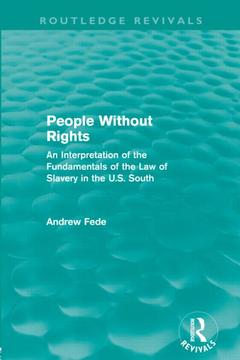Description
People Without Rights (Routledge Revivals)
An Interpretation of the Fundamentals of the Law of Slavery in the U.S. South
Routledge Revivals Series
Author: Fede Andrew
Language: English
Subjects for People Without Rights (Routledge Revivals):
Keywords
lave; appl; ied; missi; ipp; lave's; owner; den; imi; cour; Ta Tes; Appl Ica; Es Ta; Cha T T E L; Deve Lopment; Ho Ld; Slave Rights; Pro Tec; Slave Abuse; Jud Ic Ia; Master's Intent; Imi La; Capital Punishment; Slave Criminal; Ro Tec; Famil Ies; Slave Boom; Slave Stealing; Slave Murder; Roh Ib; South Carolina Case; Common Carriers; Ro Tec Ted; Slave Families; Lave Fami
Publication date: 11-2012
Support: Print on demand
Publication date: 04-2011
Support: Print on demand
Description
/li>Contents
/li>Biography
/li>
First published in September 1992, the book traces the nature and development of the fundamental legal relationships among slaves, masters, and third parties. It shows how the colonial and antebellum Southern judges and legislators accommodated slavery?s social relationships into the common law, and how slave law evolved in different states over time in response to social political, economic, and intellectual developments.
The book states that the law of slavery in the US South treated slaves both as people and property. It reconciles this apparent contradiction by demonstrating that slaves were defined in the law as items of human property without any legal rights. When the lawmakers recognized slaves as people, they burdened slaves with added legal duties and disabilities. This epitomized in legal terms slavery?s oppressive social relationships. The book also illustrates how cases in which the lawmakers recognized slaves as people legitimized slavery?s inhumanity. References in the law to the legal humanity of people held as slaves are shown to be rhetorical devices and cruel ironies that regulated the relative rights of the slaves? owners and other free people that were embodied in people held as slaves. Thus, it is argued that it never makes sense to think of slave legal rights. This was so even when the lawmakers regulated the individual masters? rights to treat their slaves as they wished. These regulations advanced policies that the lawmakers perceived to be in the public interest within the context of a slave society.
1. "The Law as to him is only a Compact between his Rulers," An Interpretation 2. The Legitimizing Role of Law in Slave Society 3. Accommodating Slavery into the Common Law 4. The Non-Legal Background to Three Trends in Antebellum Slave Law 5. The Changing Scope of White Liability for Slave Killing 6. The Changing Scope of White Liability for Non-Fatal Slave Abuse 7. Preventing Slaves from Being a Public Nuisance: Limits on his Master's Rights to Starve and Free his Slaves 8. Slave Criminals and Protection of his Master's Property Rights in Slaves: The Discrimination in the Substantive Law 9. Slave Criminals and Protection of his Master's Property Rights in Slaves: What Process was Due? 10. The Recognition of Slave Humanity to Settle the Rights of Whites that were Embodied in Slaves 11. The Impotence of Slave Humanity as an Impediment to the Separation of Slave Families 12. Conclusion: The Reification of Humanity




